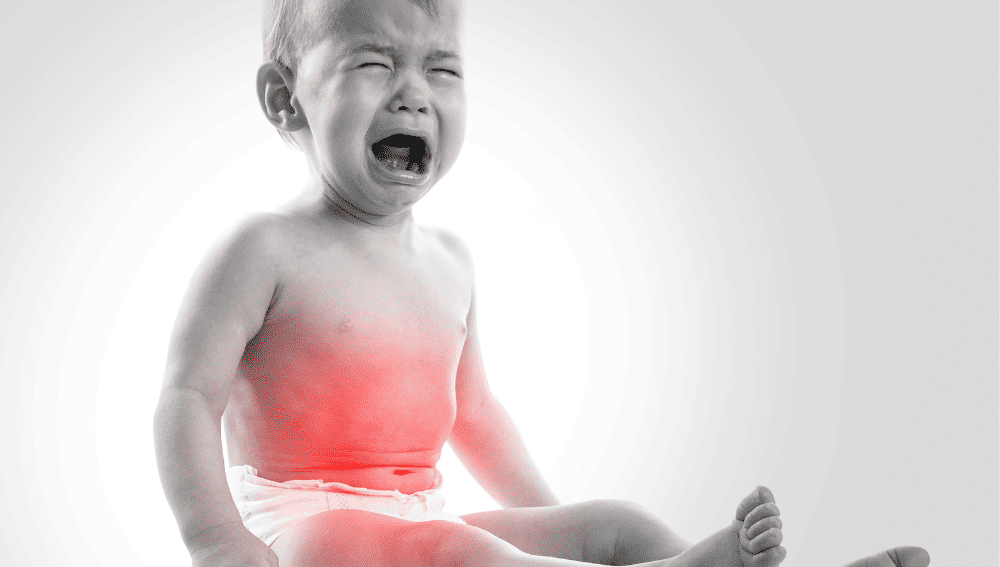Breast milk is the ideal source of nutrition for infants. It provides all the necessary nutrients and antibodies to help babies grow and develop.
However, some parents may notice that their breastfed babies experience gas after feeding, leading to concerns about the quality or temperature of the milk. One common question is whether cold breast milk causes gas in babies.
Understanding Breast Milk and Gas Breast milk is naturally warm when it comes out of the breast, but it can be stored in the refrigerator or freezer for later use. When it’s time to feed the baby, the milk can be warmed up to room temperature or body temperature before serving.
Some parents may prefer to give their baby cold milk straight from the refrigerator, especially during hot weather or when they are on the go. However, there is a common belief that cold breast milk can cause gas in babies.
Feeding and Its Relation to Gas Gas is a normal part of the digestive process, and most babies experience it to some degree. However, excessive gas can cause discomfort, fussiness, and even colic in some babies.
There are many factors that can contribute to gas in breastfed babies, including feeding habits, milk flow, and the baby’s digestive system. While cold breast milk may not directly cause gas, it can affect the baby’s feeding habits and milk flow, which can in turn lead to gas.
Key Takeaways
- Breast milk is the ideal source of nutrition for infants, but some parents may be concerned about gas after feeding.
- Cold breast milk may not directly cause gas, but it can affect feeding habits and milk flow, which can contribute to gas.
- Parents can try different feeding techniques and positions, as well as burping and massaging their baby, to help soothe and relieve gas.
Understanding Breast Milk and Gas
Breast milk is the primary source of nutrition for breastfed babies, providing all the necessary nutrients and antibodies for their growth and development. However, some babies may experience gas or colic after feeding, which can cause discomfort and distress.
Gas is a natural byproduct of digestion, occurring when food is broken down in the digestive system. Breast milk contains a range of nutrients, including carbohydrates, proteins, and fats, which are essential for a baby’s growth and development.
However, some babies may have difficulty digesting certain components of breast milk, leading to gas and discomfort.
Dairy products, including cow’s milk, contain lactose, a type of sugar that can be difficult for some babies to digest. However, breast milk contains a different type of sugar called lactose, which is easier to digest.
Breast milk also contains enzymes that help to break down the nutrients and promote digestion.
Cold breast milk is safe to feed to a baby, but it may cause discomfort or gas if the baby’s digestive system is not fully developed. Frozen breast milk should be thawed slowly in the refrigerator or under running water, as rapid thawing can destroy some of the nutrients and enzymes.
Room temperature breast milk is safe to feed to a baby, but it may not be as fresh or nutritious as freshly expressed milk. Breast milk should be stored in a clean, sterile container and used within a certain period to ensure its safety and quality.
In summary, breast milk is a complex and nutritious food that provides essential nutrients and antibodies for a baby’s growth and development.
However, some babies may experience gas or discomfort after feeding, which can be caused by a range of factors, including the baby’s digestive system, nutritional composition of breast milk, and temperature of the milk.
Feeding and Its Relation to Gas
Breastfeeding is the most natural way to feed a baby and provides many benefits to both the mother and the baby. However, some babies may experience gas or colic after feeding. This can be due to a variety of factors, including feeding techniques and the baby’s individual digestive system.
One important factor to consider is the latch. A good latch is essential for effective feeding and can help prevent excess air from entering the baby’s digestive system.
If the baby is not latched properly, they may swallow more air, which can lead to gas and discomfort.
Another important factor is the feeding position. The mother should be comfortable and relaxed while breastfeeding, and the baby should be in a position that allows them to swallow milk without swallowing air.
The baby’s head should be slightly elevated, and their body should be facing the mother’s breast.
Burping is also an important technique to help prevent gas. The baby should be burped after feeding, and the mother should try different positions to find the most effective method for their baby.
Some mothers may choose to warm breast milk before feeding. While this can be a personal preference, it is important to note that warming breast milk can cause a breakdown of some of the nutrients and proteins in the milk.
Additionally, overheating breast milk can also cause excess air to be trapped in the milk, which can lead to gas.
In general, it is important to be aware of how the baby is feeding and to make adjustments as necessary. Swallowing air can be a common cause of gas, so ensuring a good latch and feeding position can help prevent excess air from entering the baby’s digestive system.
Signs and Symptoms of Gas in Babies
Gas in babies can cause discomfort, crying, colic, fussiness, bloating, constipation, excess gas, gas pains, vomiting, and nausea. It is important to understand the signs and symptoms of gas in babies so that parents and caregivers can provide relief to the baby.
When a baby has gas, they may cry and fuss more than usual, especially after feedings. They may also arch their back, clench their fists, and pull their legs up to their chest.
These are all signs that the baby is experiencing discomfort.
Other signs of gas in babies include diarrhea, bloating, constipation, and excessive gas. The baby may pass gas frequently, and the gas may have a foul odor. Gas pains can also cause the baby to wake up frequently during the night.
If the baby is vomiting or experiencing nausea, it may be a sign of a more serious condition and medical attention should be sought immediately.
In some cases, gas can also be a symptom of a food allergy or intolerance. If the baby continues to experience gas despite efforts to relieve it, parents and caregivers should consult a healthcare provider to rule out any underlying medical conditions.
Overall, recognizing the signs and symptoms of gas in babies is important for providing comfort and relief to the baby.
Causes of Gas in Breastfed Babies
Gas is a common problem in breastfed babies, and it can be caused by a variety of factors. Some of the common causes of gas in breastfed babies are discussed below:
Immature Digestive System
The digestive system of a newborn baby is not fully developed and may take some time to mature. This can make it difficult for the baby to digest breast milk, leading to gas and discomfort.
Mom’s Diet
The foods that a breastfeeding mother eats can affect the composition of her breast milk and may cause gas in her baby. Some babies may be sensitive to certain foods, such as dairy products, and may develop gas if their mother consumes them.
Digesting Certain Foods
Some babies may have difficulty digesting certain foods, such as those that are high in fiber or sugar. This can cause gas and discomfort in the baby.
Cold Breast Milk
Some experts believe that feeding a baby cold breast milk can cause gas. This is because cold milk may be harder to digest, and the baby may need to work harder to break down the milk.
Colic
Colic is a condition in which a baby cries for several hours a day, often in the evening. The exact cause of colic is unknown, but it may be related to digestive issues, such as gas.
Diseases
In some cases, gas in breastfed babies may be a symptom of an underlying medical condition, such as gastroesophageal reflux disease (GERD) or lactose intolerance.
If a baby is experiencing excessive gas or discomfort, parents should talk to their pediatrician. Keeping a food journal and monitoring the baby’s symptoms can help identify any potential triggers, such as certain foods or feeding positions.
How to Soothe and Relieve Gas in Babies
Gas in babies can be uncomfortable and painful, but there are several techniques that can help soothe and relieve your baby’s discomfort.
Here are some tips that can help:
Feeding Techniques
One of the most effective ways to prevent gas in babies is to use proper feeding techniques. Make sure your baby is latching on correctly and is not swallowing air during feeding.
To help prevent air from being swallowed, try the following:
- Hold your baby in an upright position during feeding.
- Burp your baby frequently during feedings.
- Use a slow flow nipple to help regulate the flow of milk.
Tummy Time
Tummy time can help relieve gas in babies by allowing them to move around and release trapped gas. Place your baby on their stomach for a few minutes each day, making sure to supervise them at all times.
Gas Drops
Gas drops can help relieve gas in babies by breaking down the gas bubbles in their stomach. Follow the instructions on the package for proper dosage and use.
Also, read: Can You Give Gripe Water and Gas Drops Together
Swallowing Air
Babies can swallow air when they cry or when they are feeding. To help prevent this, try to soothe your baby before they start crying and make sure they are latching on correctly during feeding.
Colic Signs
If your baby is crying excessively, arching their back, or has a bloated stomach, they may be experiencing colic. Talk to your pediatrician about possible treatments and techniques to help soothe your baby.
Remember, every baby is different and what works for one may not work for another. If you are concerned about your baby’s gas or discomfort, talk to your pediatrician for personalized advice.
Role of Diet in Gas Production
The diet of both the breastfeeding mother and the infant can play a role in gas production. Certain foods and nutrients can cause gas, while others can help alleviate it.
For parents, keeping a food journal can help identify which foods may be causing gas in the infant. Dairy products, high-fiber foods, and certain fruits and vegetables can be common culprits.
It is important to note that not all infants will be affected by the same foods, so it may take some trial and error to determine which ones to avoid.
For the breastfeeding mother, her diet can also impact the gas production in her infant. Consuming dairy products may cause gas in some infants, as they may have difficulty digesting lactose.
However, it is not necessary for all breastfeeding mothers to eliminate dairy from their diet.
In addition to avoiding certain foods, consuming probiotics can also help alleviate gas. Probiotics can help improve the balance of bacteria in the digestive system, which can aid in digestion and reduce gas production.
Overall, while diet can play a role in gas production, it is important to maintain a balanced and varied diet to ensure adequate nutrient intake for both the mother and infant.
Safety Measures in Handling Breast Milk
When it comes to handling breast milk, there are several safety measures that should be taken into consideration. Proper handling and storage of breast milk can help prevent contamination and ensure that it remains safe for consumption.
One of the most important things to keep in mind is to always wash hands thoroughly before handling breast milk. This helps to prevent the transfer of bacteria and other harmful substances to the milk.
Additionally, any equipment used to pump or store breast milk should be thoroughly cleaned and sanitized before and after each use.
It is also important to be mindful of the temperature of breast milk. Cold breast milk can cause gas in infants, so it is important to warm it up before feeding.
However, it is important to avoid overheating the milk, as this can destroy some of the nutrients and antibodies that make breast milk so beneficial for infants.
When warming breast milk, it is recommended to use a bottle warmer or warm water instead of a microwave. Microwaving breast milk can create hot spots that can burn the baby’s mouth and throat, and can also destroy some of the beneficial components of the milk.
Breast milk can be stored at room temperature for up to four hours, but it is recommended to refrigerate it as soon as possible after pumping.
Breast milk can be stored in the refrigerator for up to five days, and in the freezer for up to six months.
In summary, proper handling and storage of breast milk is essential for ensuring its safety and nutritional value. By following these safety measures, parents can feel confident in providing their infants with the benefits of breast milk.
Support for New Parents
Being a new parent can be overwhelming and exhausting. It is important for new parents to have a support system in place to help them navigate the challenges of caring for a newborn.
Pediatricians and lactation consultants can provide valuable guidance and support to new parents. They can help answer questions about breastfeeding, formula feeding, and general infant care.
They can also provide resources and referrals to other professionals or community organizations that can offer additional support.
Family and friends can also play a crucial role in supporting new parents. They can help with household chores, provide meals, or simply offer a listening ear.
Joining a community of other new parents can also be beneficial. It can provide a sense of camaraderie and a space to share experiences and advice. Many communities offer parent support groups or playgroups that can be a great way to connect with other new parents.
Overall, having a support system in place can help new parents feel more confident and capable in their new role. It is important to remember that it is okay to ask for help and that no one has to do it all alone.
Special Cases and Considerations
When it comes to feeding babies, there are some special cases and considerations to keep in mind. Here are some factors that may affect whether or not cold breast milk causes gas in certain situations:
Premature Infants
Premature infants may be more sensitive to temperature changes, including changes in the temperature of their breast milk. It is generally recommended that breast milk be warmed to room temperature before feeding premature infants to avoid any potential gastrointestinal discomfort.
Newborns
Newborns have immature digestive systems and may be more prone to gas and colic. While cold breast milk may not necessarily cause gas in all newborns, it may be beneficial to warm the milk slightly to help aid digestion.
Teething
Teething can cause discomfort and irritability in babies, which may lead to increased gas and fussiness. In these cases, offering cold breast milk may actually help soothe sore gums and provide relief.
Pregnant and Breastfeeding Mothers
Mothers who are pregnant or breastfeeding may experience changes in their milk production and composition. It is important to consult with a pediatrician if there are concerns about the effects of cold breast milk on the baby’s digestion.
Pediatrician Recommendations
Ultimately, the decision to offer cold or warm breast milk to a baby should be made in consultation with a pediatrician. They can provide guidance on the specific needs of the baby and any special considerations that should be taken into account.
Frequently Asked Questions
Can cold breast milk cause gas?
Cold breast milk is not known to cause gas in babies. However, some babies may prefer warm milk, and if they are fed cold milk, they may swallow more air, which can lead to gas.
Can frozen breast milk cause gas?
Frozen breast milk does not cause gas in babies. However, some babies may have trouble digesting milk that has been frozen and thawed, which can lead to gas.
Is it bad to give baby cold breast milk?
It is not bad to give a baby cold breast milk. In fact, many babies prefer milk that is at room temperature or slightly chilled. However, if a baby is used to warm milk, they may not like cold milk and may swallow more air, which can lead to gas.
Why is my breastmilk making my baby gassy?
Breast milk can make a baby gassy if the baby has trouble digesting it. This can happen if the baby is swallowing too much air while feeding, if the mother is eating foods that are hard to digest, or if the baby has a sensitivity to something in the mother’s diet.
Do cold bottles give babies gas?
Cold bottles do not give babies gas. However, if a baby is used to warm bottles, they may not like cold bottles and may swallow more air, which can lead to gas.
Can preemies drink cold breast milk?
Preemies can drink cold breast milk, but it is important to warm the milk to room temperature or body temperature before feeding if the baby prefers warm milk.
Feeding cold milk to a preemie can cause their body temperature to drop, which can be dangerous.
Learn more about breast milk: How To Make Breastmilk Fattier

Iesha is a loving mother of 2 beautiful children. She’s an active parent who enjoys indoor and outdoor adventures with her family. Her mission is to share practical and realistic parenting advice to help the parenting community becoming stronger.



